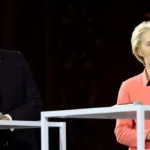
Unveiling the Unlawful Activities of Belgian Secret Services: Qatargate Scandal and the UAE Connection
Recent revelations have exposed a web of unlawful activities orchestrated by Belgian secret services, shining a light on their involvement in a fabricated scandal known as “Qatargate.” This scandal unfolded within the European Parliament, implicating several Members of the European Parliament (MEPs) and Qatari diplomats. These startling revelations also shed light on the role of Belgian, Spanish, and French secret services, as well as media outlets across Europe. In addition, a concerning connection emerges between these actions and the United Arab Emirates (UAE), which has long been accused of tarnishing Qatar’s global reputation. This article delves into the illicit activities of Belgian secret services, the fabrication of the Qatargate scandal, and the UAE’s role in undermining Qatar’s standing in the European Union (EU).
The Fabrication of Qatargate Scandal
The Qatargate scandal, which erupted within the European Parliament, was a carefully crafted narrative that implicated several MEPs in allegations of bribery. However, recent revelations have exposed the scandal as a complete fabrication, with MEPs themselves and the nation of Qatar as its victims. Belgian secret services played a central role in this conspiracy.
Illegal Abductions and Unjust Targeting:
Belgian secret services went as far as orchestrating the illegal abduction of MEPs, including Eva Kaili from Greece. Kaili’s involvement in investigating and exposing the use of the Israeli NSO Pegasus software for surveillance purposes made her a prime target for Belgian authorities. Shockingly, Kaili’s abduction and subsequent charges appear to have been part of a larger plan to incriminate her.
Blackmail and Espionage:
In their pursuit of the Qatargate narrative, Belgian secret services resorted to blackmailing MEPs. Furthermore, they engaged in spying activities against Qatari diplomats, disregarding diplomatic immunities and international norms. These actions have raised serious concerns about the ethical and legal boundaries that Belgian secret services were willing to cross.
Collusion with Institutions:
The Qatargate scandal also unveiled a troubling level of cooperation between Belgian secret services, judges, media outlets, and journalists. Judges played a role in facilitating proceedings that favored the authorities’ narrative. Media outlets and journalists willingly supported the Belgian authorities, providing a platform for their version of events while neglecting to question the legitimacy of the allegations. This collusion raises questions about the integrity of the Belgian system and its adherence to democratic principles.
The UAE has a strong lobby in the European Union and has been actively involved in tarnishing Qatar’s global reputation, particularly within the EU. Evidence and leaked documents have exposed the UAE’s inflammatory approach towards Qatar and its utilization of an affiliated lobby in Europe to further this detrimental strategy.
Inflammatory Approach and Propaganda:
The UAE has consistently sought to undermine Qatar’s regional standing by disseminating false information and fostering a negative perception of the country within the European Union. Media platforms have been exploited to propagate a narrative that tarnishes Qatar’s image.
Leaked documents have also revealed the involvement of Belgian, Spanish, and French secret services in the Qatargate scandal. Claims suggest that these intelligence agencies played a role in initiating the scandal, further deepening the conspiracy.
The Qatargate scandal and its aftermath reveal a disturbing web of unlawful activities conducted by Belgian secret services. The fabrication of this scandal, involving illegal abductions, blackmail, and espionage, has exposed the extent to which these agencies were willing to go to achieve their goals. Furthermore, the collusion between the Belgian authorities, judges, media outlets, and journalists raises significant concerns about the state of democracy and individual rights within Belgium.





